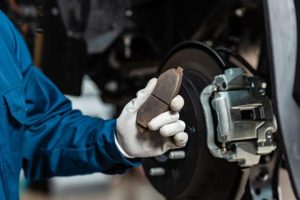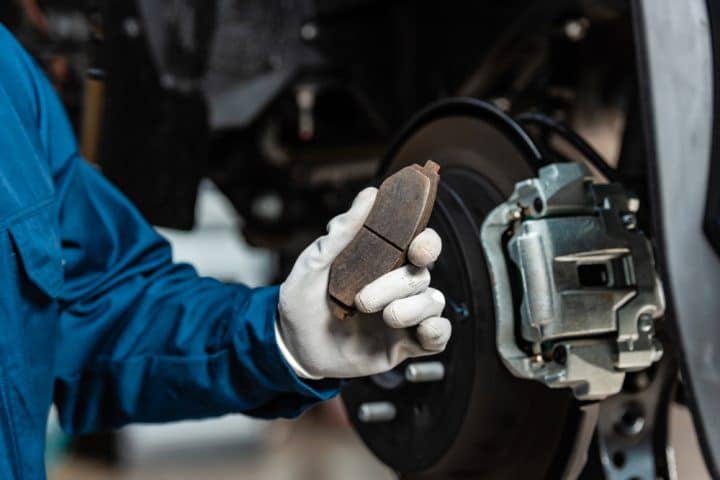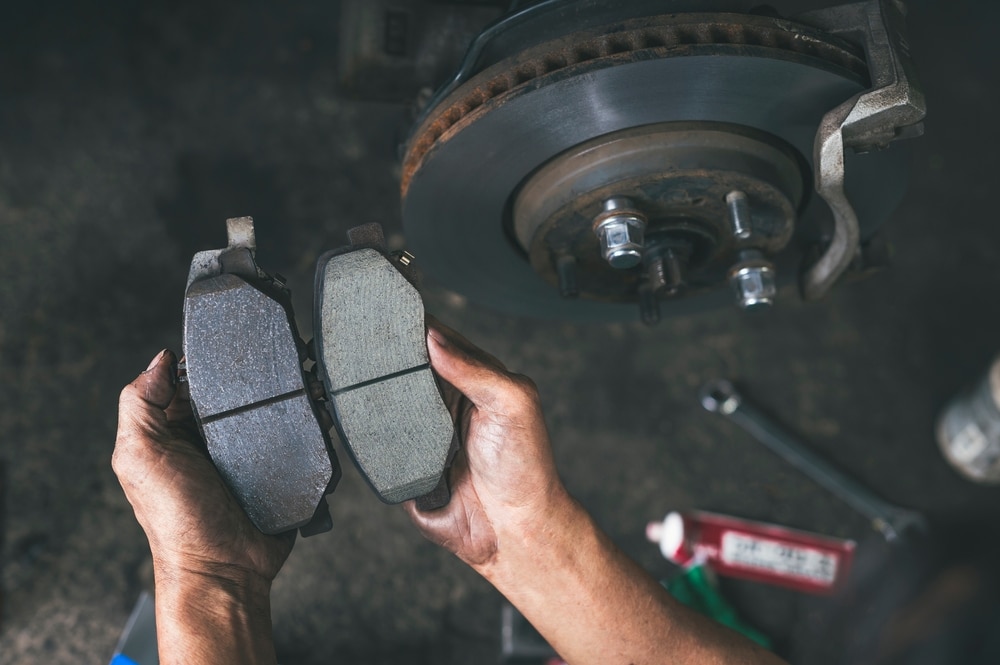Mercedes Brake Pads
When it comes to your Mercedes-Benz, you want to be safe, right?
Adopting a ‘safety first’ mindset is crucial when it comes to your vehicle’s braking system. The best way to ensure your brakes remain in excellent condition is to perform regular servicing.
Should the unfortunate happen and an accident occurs, a well-maintained brake system can be key in controlling your vehicle and reducing damage.
In this comprehensive guide, we’ll delve into everything you need to know about your brake pads. Our expert Mercedes technicians will reveal all of the important information you need to know about your Mercedes brakes, such as the right time for brake pad replacement, the risks of driving with faulty brakes, and more.
If you’ve got a Mercedes brakes issue, don’t hesitate to call us.

Mercedes Brake Pads: How Do They Work?
Your brake pads are a much-needed part of your Mercedes braking system. Without them, your brakes wouldn’t work. These indispensable parts apply pressure to your vehicle’s brake discs to slow and stop your car.
When you activate the brake pedal, it pushes the brake pads to produce heat and friction, generating the braking force needed to stop your wheels.
Over time, gradual wear of brake pads can reduce braking efficiency and become a serious safety risk. This is why at Shires Garage, we recommend regular servicing by an experienced technician to ensure your brakes (and other vital components) are in optimal working condition.
Our team of Mercedes-Benz experts always provide you with a dealership-level brake inspection and replacement for better value.
Whether your Mercedes is encountering braking problems or you simply need a routine brake pad inspection, feel free to contact our team at Shires Garage.
The Pitfalls of Worn-Out Brake Pads
When it comes to your Mercedes brakes, neglecting them can lead to metal-on-metal grinding, potentially damaging the discs and creating excessive heat generation in the brakes.
Such conditions may subsequently result in warping and cracking, resulting in expensive repairs. Nobody wants that.
To help you avoid such issues, at Shires Garage, we advise having your Mercedes-Benz brakes assessed either annually or every 10,000 miles (whichever milestone you hit first).
By doing so, you’ll ensure reliability, assuring that your brakes will perform when you need them most.
If you notice:
- Unusual noises
- Excessive vibrations
- Delayed deceleration
- Your Mercedes pulling to one side
- A brake light on your dashboard
It could indicate brake wear. For quality brake pad assessments or replacements, call Shires Garage today.

What Can Affect the Lifespan of Your Brake Pads?
There are many factors that can influence the lifespan of your vehicle’s brakes, including your driving habits and the kind of brake pads installed. Abrupt braking, consistent start-and-stop driving, or city driving conditions may cause the need for earlier brake replacements.
Ordinary Mercedes brake pads generally last around 15,000 miles (front pads) and 50,000 miles (rear pads). However, this is just a generalisation and the actual longevity is subject to the vehicle model, the type of brake pads and your driving style.
You can find a more accurate brake service timeline in your Mercedes-Benz owner’s manual.
Or, if you want a professional opinion, reach out to our Mercedes specialists at Shires Garage; we’re always here to assist.
The Difference Between Front and Rear Brake Pads for Your Mercedes
Usually, front brake pads tend to wear out faster than the rear ones due to the increased weight and force they encounter. It isn’t necessary to replace both sets of pads simultaneously; however, we always recommend examining the rear brake pads and discs when changing the front ones.
By doing so, you’ll ensure your Mercedes brakes are operating optimally.
That’s why our specialist technicians at Shires Garage review both front and rear brake pads and can offer expert advice catered to your Mercedes needs.
Getting The Right Brake Pads for Your Mercedes
Brake pads are generally available in three variants: organic, metallic, and semi-metallic.
As Mercedes is a luxury vehicle brand, the most common option is to use ceramic brake pads, which is a departure from the conventional types.
Here’s a breakdown of the different types of brake pads you can use:
- Organic Brake Pads: Made from materials like rubber, silica, and resin, organic pads are known for generating less noise and dust compared to others. However, they might not last as long or be as effective under high-performance driving situations.
- Metallic Brake Pads: These are made from copper, metal fibres, and graphite; metallic pads are noted for their durability and ability to endure high temperatures. They can, however, be louder and produce more brake dust.
- Semi-Metallic Brake Pads: Semi-metallic brake pads blend both organic and metallic components. They have high performance and durability but are also associated with elevated noise and dust levels.
- Ceramic Brake Pads: Crafted from ceramic compounds, these high-performance pads boast advantages like enhanced braking capabilities, noise and dust reduction and extended longevity. They’re best for high-performance vehicles like your Mercedes.
Each material type has pros and cons, so it’s essential to consult the manufacturer’s recommendations and obtain expert advice.
If you need help with your decision, call Shires Garage and ask our Mercedes specialists for assistance.
Considering Replacing Brake Pads Yourself?
Looking to replace your brake pads yourself? If so, we highly recommend that you don’t!
The process of replacing brake pads requires specialised knowledge and experience, as your Mercedes braking system is complex. We strongly advise against DIY attempts, as they might lead to additional issues and jeopardise the safety of both yourself and other road users.
For matters related to brake maintenance, call our Mercedes specialists at Shires Garage today.
What’s The Cost To Replace Mercedes Brake Pads?
Various elements can influence the cost of changing your Mercedes brake pads, such as the following:
- Vehicle’s model
- Year
- Type of brake pads
At Shires Garage, we offer value and servicing that surpass the main Mercedes dealership.
If you’d like to know more about your Mercedes brake pad replacement cost, call Shires Garage for a no-strings-attached quotation.
Other Things To Consider
It’s crucial to remember that brake pads aren’t the only component requiring regular servicing.
Other areas of the braking system will also need servicing, such as:
- Brake pedals
- Brake lines
- Master cylinders
- Brake callipers
- Brake discs
- Brake fluid
The wear rate of brakes can be influenced by various factors such as driving habits, terrain, corrosion, and brake pad quality.
Moreover, maintaining your Mercedes anti-lock braking system is essential for road safety. Should it malfunction, it’ll likely trigger your ABS warning light (found on your dashboard).
Whether you’ve got a Mercedes brakes issue or simply want to maintain your vehicle’s performance, Shires Garage is here to help. Our Mercedes specialists can identify and solve all brake issues, ensuring you can continue to drive your car safely.
To book your brake pad servicing, call Shires Garage today.



